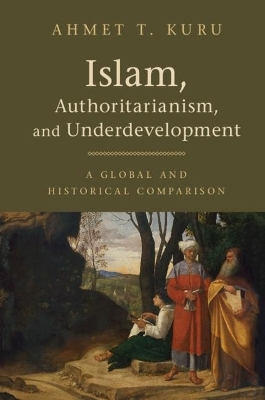
Islam, Authoritarianism, and Underdevelopment
Cambridge University Press (Verlag)
978-1-108-40947-6 (ISBN)
Why do Muslim-majority countries exhibit high levels of authoritarianism and low levels of socio-economic development in comparison to world averages? Ahmet T. Kuru criticizes explanations which point to Islam as the cause of this disparity, because Muslims were philosophically and socio-economically more developed than Western Europeans between the ninth and twelfth centuries. Nor was Western colonialism the cause: Muslims had already suffered political and socio-economic problems when colonization began. Kuru argues that Muslims had influential thinkers and merchants in their early history, when religious orthodoxy and military rule were prevalent in Europe. However, in the eleventh century, an alliance between orthodox Islamic scholars (the ulema) and military states began to emerge. This alliance gradually hindered intellectual and economic creativity by marginalizing intellectual and bourgeois classes in the Muslim world. This important study links its historical explanation to contemporary politics by showing that, to this day, ulema-state alliance still prevents creativity and competition in Muslim countries.
Ahmet T. Kuru is Professor of Political Science and Director of the Center for Islamic and Arabic Studies at San Diego State University. He is the author of the award-winning Secularism and State Policies toward Religion: The United States, France, and Turkey (Cambridge, 2009) and co-editor (with Alfred Stepan) of Democracy, Islam, and Secularism in Turkey (2012). His works have been translated into Arabic, Chinese, French, and Turkish.
Introduction; Part I. Present: 1. Violence and peace; 2. Authoritarianism and democracy; 3. Socio-economic underdevelopment and development; Part II. History: 4. Progress: scholars and merchants (seventh to eleventh centuries); 5. Crisis: the invaders (twelfth to fourteenth centuries); 6. Power: three Muslim empires (fifteenth to seventeenth centuries); 7. Collapse: Western colonialism and Muslim reformists (eighteenth to nineteenth centuries); Conclusion.
| Erscheinungsdatum | 01.08.2019 |
|---|---|
| Zusatzinfo | Worked examples or Exercises; 5 Tables, black and white |
| Verlagsort | Cambridge |
| Sprache | englisch |
| Maße | 152 x 228 mm |
| Gewicht | 480 g |
| Themenwelt | Geisteswissenschaften ► Geschichte ► Regional- / Ländergeschichte |
| Geisteswissenschaften ► Religion / Theologie ► Islam | |
| Sozialwissenschaften ► Politik / Verwaltung ► Vergleichende Politikwissenschaften | |
| Sozialwissenschaften ► Soziologie ► Spezielle Soziologien | |
| ISBN-10 | 1-108-40947-4 / 1108409474 |
| ISBN-13 | 978-1-108-40947-6 / 9781108409476 |
| Zustand | Neuware |
| Haben Sie eine Frage zum Produkt? |
aus dem Bereich


